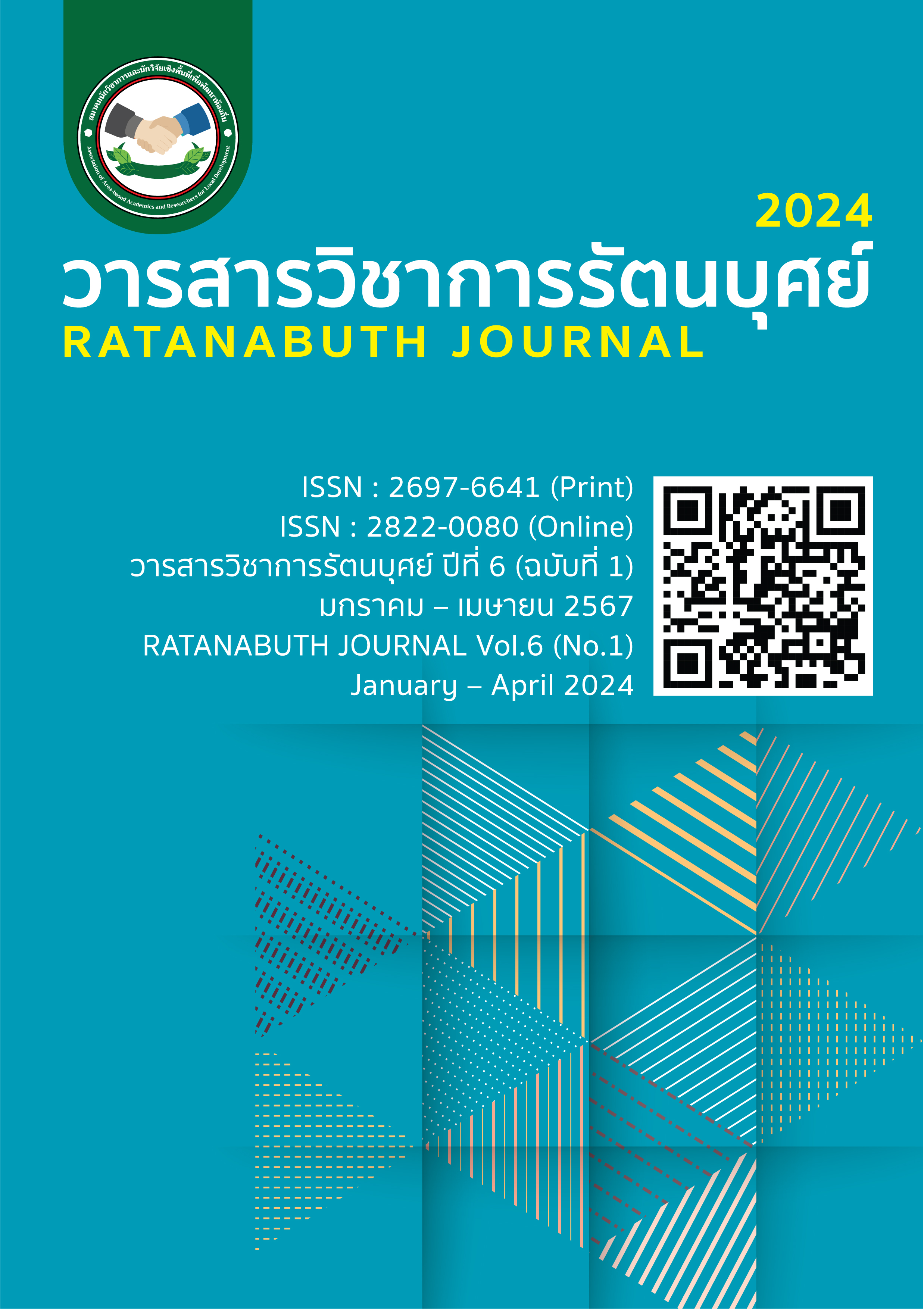บทบาทของระบบการจัดการการขนส่งขั้นสูงในการเพิ่มประสิทธิภาพ การกระจายอาหารแช่แข็งจากประเทศไทยไปยังประเทศญี่ปุ่น Role of Advanced Transportation Management Systems in Enhancing the Distribution of Frozen Food from Thailand to Japan
Main Article Content
บทคัดย่อ
การพัฒนาเทคโนโลยีในสมัยปัจจุบันมีผลกระทบอย่างมากต่อวงการขนส่งและโซลูชันในการจัดการการขนส่ง Transportation management system (TMS) โดยเฉพาะในการขนส่งสินค้าแช่แข็งซึ่งมีความสำคัญอย่างมากในการเปิดตลาดระหว่างประเทศ ซึ่งประเทศไทยและญี่ปุ่นอาหารแช่แข็งนั้นมีความนิยมและมีความต้องการสูงจากตลาดโลกเป็นอย่างมาก การศึกษาผลกระทบที่อาจเกิดขึ้นจากระบบการจัดการการขนส่งสมัยใหม่ต่อการเพิ่มประสิทธิภาพของการจัดส่งอาหารแช่แข็งระหว่างประเทศไทยและญี่ปุ่นจึงจำเป็นต้องพิจารณาและการวิเคราะห์อย่างละเอียดเพื่อหาวิธีแก้ไขและการปรับปรุงให้กับระบบ Transportation management system (TMS) ให้สามารถทำงานได้อย่างมีประสิทธิภาพในสถานการณ์ที่ซับซ้อนและเปลี่ยนแปลงได้ตลอดเวลา การศึกษาครั้งนี้มีวัตถุประสงค์ เพื่อศึกษาผลกระทบที่อาจเกิดขึ้นจากระบบการจัดการการขนส่งสมัยใหม่ Transportation management system (TMS) ต่อการเพิ่มประสิทธิภาพของการจัดส่งอาหารแช่แข็งระหว่างประเทศไทยและญี่ปุ่น บทบาทของ Transportation management system (TMS) ระดับสูงในการปรับปรุงกระบวนการกระจายสินค้า การเอาชนะอุปสรรค และการสูงสุดในการให้ประโยชน์แก่ผู้มีส่วนได้ส่วนเสีย การวิจัยใช้วิธีการทบทวนเรื่องราว โดยที่ข้อมูลถูกสะสมมาจากการตีพิมพ์ทางวิชาการที่น่าเชื่อถือ รายงานอุตสาหกรรม และเอกสารทางกฎหมาย ข้อเลือกของเกณฑ์การเลือกถูกกำหนดโดยการพิจารณาตัวแปรเช่นความเกี่ยวข้อง ความเป็นไปได้ และความน่าเชื่อถือของระบบการจัดการขนส่งระดับสูงมีประโยชน์หลายประการ เช่น การปรับปรุงเส้นทาง ความสามารถในการติดตามการดำเนินการแบบทันทีทันใดตามเวลาจริง เป็นการประหยัดเงิน ลดระยะเวลาการขนส่ง และเพิ่มมาตรฐานสินค้า แม้ว่าการนำ Transportation management system (TMS) ที่ซับซ้อนมาใช้จะนำเสนอประโยชน์ที่ชัดเจน แต่ยังมีอุปสรรคที่ยังคงอยู่เกี่ยวกับการรวมเทคโนโลยี การฝึกอบรม และค่าใช้จ่ายในการลงทุนเริ่มต้น อย่างไรก็ตาม ข้อได้เปรียบที่ยั่งยืน เช่น ผลกำไรทางการเงินที่เพิ่มขึ้น และความพึงพอใจของลูกค้าที่เพิ่มขึ้น Transportation management system (TMS) ขั้นสูงกลายเป็นตัวเร่งให้เกิดการเปลี่ยนแปลงที่สำคัญในอุตสาหกรรมการจำหน่ายอาหารแช่แข็งระหว่างประเทศไทยและญี่ปุ่น บทความนี้นำเสนอการตรวจสอบการใช้ Transportation management system (TMS) ขั้นสูงภายในขอบเขตเฉพาะของการค้าอาหารแช่แข็งระหว่างประเทศไทยและญี่ปุ่น การตอบสนองความต้องการด้านการวิจัยที่สำคัญทำให้ได้รับข้อมูลเชิงลึกอันมีค่าที่อาจนำไปใช้โดยผู้มีส่วนได้ส่วนเสียในภาคส่วนนี้
Article Details

อนุญาตภายใต้เงื่อนไข Creative Commons Attribution-NonCommercial-NoDerivatives 4.0 International License.
เอกสารอ้างอิง
Amin-Naseri, M. (2018). Adopting and incorporating crowdsourced traffic data in advanced transportation management systems. Iowa State University. Retrieved from https://medium.com/@arifwicaksanaa/pengertian-use-case-a7e576e1b6bf
Aung, M. M., & Chang, Y. S. (2014). Traceability in a food supply chain: Safety and quality perspectives. Food Control, 39(1), 172–184. https://doi.org/10.1016/j.foodcont.2013.11.007
Baethge, C., Goldbeck-Wood, S., & Mertens, S. (2019). SANRA una escala para la evaluación de la calidad de los artículos de revisión narrativa. [SANRA—a scale for the quality assessment of narrative review articles]. Research Integrity and Peer Review, 4(1), 2–8. Retrieved from https://www.ncbi.nlm.nih.gov/pmc/articles/PMC6434870/
Bahn, R. A., Yehya, A. A. K., & Zurayk, R. (2021). Digitalization for Sustainable Agri-Food Systems: Potential, Status, and Risks for the MENA Region. Sustainability, 13(6), 3223. https://doi.org/10.3390/su13063223
Bardi, E. J., & Tracey, M. (1991). Outsourcing: A Survey of US Practices. International Journal of Physical Distribution, (December 1990), 15–21.
Blandon, A., & Ishihara, H. (2021). Seafood certification schemes in Japan: Examples of challenges and opportunities from three Marine Stewardship Council (MSC) applicants. Marine Policy, 123(November 2020), 104279. https://doi.org/10.1016/j.marpol.2020.104279
Chen, Lin, Dong, T., Peng, J., & Ralescu, D. (2023). Uncertainty Analysis and Optimization Modeling with Application to Supply Chain Management: A Systematic Review. Mathematics, 11(11). https://doi.org/10.3390/math11112530
Ferrari, R. (2015). Writing narrative style literature reviews. Medical Writing, 24(4), 230–235. https://doi.org/10.1179/2047480615z.000000000329
Jayakrishnan, R., Oh, J. S., & Sahraoui, A. E. K. (2001). Calibration and path dynamics issues in microscopic simulation for advanced traffic management and information systems. Transportation Research Record, (1771), 9–17. https://doi.org/10.3141/1771-02
Kikuchi, P., & Yamao, M. (2014). Japanese Consumer Cooperative: An Alternative Institutional Model to Promote Organizational Learning for Cooperatives in Thailand.Pornprapa.
Kitayama, D., Takanokura, M., Ogiya, M., Eksan, S. H. R., & Ali, M. H. (2018). A study on the halal food supply chain in Japan from an inbound perspective. Lecture Notes in Engineering and Computer Science, 2.
Chen, Liang, Anandhan, P., & S, B. (2020). Analysis of performance-based issues in green transportation management systems in smart cities. Electronic Library, 38(5–6), 963–977. https://doi.org/10.1108/EL-07-2020-0205
Mohamed, S. A. E., & AlShalfan, K. A. (2021). Intelligent Traffic Management System Based on the Internet of Vehicles (IoV). Journal of Advanced Transportation, 2021(c), 1–23. https://doi.org/10.1155/2021/4037533
Pungchompoo, S., & Sopadang, A. (2015). Confirmation and evaluation of performance measurement model for the Thai frozen shrimp chain. Business Process Management Journal, 21(4), 837–856. https://doi.org/10.1108/BPMJ-06-2014-0053
Sattayathamrongthian, M., & Vanpetch, Y. (2022). Business’s Transportation Management System Technology Adoption in Nakhon Pathom, Thailand. Transportation Research Procedia, 63, 2449–2457. https://doi.org/10.1016/j.trpro.2022.06.281
Shadrin, S. S., Varlamov, O. O., & Ivanov, A. M. (2017). Experimental autonomous road vehicle with logical artificial intelligence. Journal of Advanced Transportation,2017. https://doi.org/10.1155/2017/2492765
Stefansson, G., & Lumsden, K. (2009). Performance issues of Smart Transportation Management systems. International Journal of Productivity and Performance Management, 58(1), 55–70. https://doi.org/10.1108/17410400910921083
Tien, N. H., Bien, B. X., Tien, N. Van, & Abstract. (2019). Solutions enhancing competitiveness of made-in Vietnam brands in Vietnamese market. International Journal of Research in Marketing Management and Sales, 1(2), 93–99. Retrieved from https://www.researchgate.net/publication/338752841_Solutions_enhancing_competitiveness_of_made-in-_Vietnam_brands_in_Vietnamese_market
Uddin, M. T. (2009). Value Chains and Standards in Shrimp Export from Bangladesh and Thailand to Japan: A Comparative Study on Safety Compliances. Asia-Pacific Journal of Rural Development, 19(1), 89–108. https://doi.org/10.1177/1018529120090106
Wang, K. (2016). Logistics 4.0 Solution-New Challenges and Opportunities. Iwama, 68–74. https://doi.org/10.2991/iwama-16.2016.13


